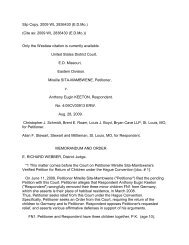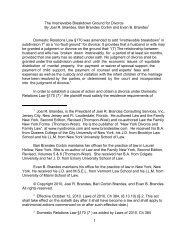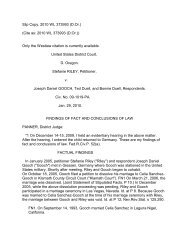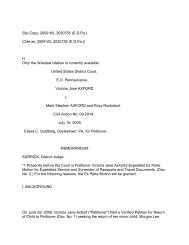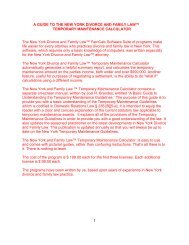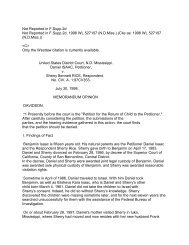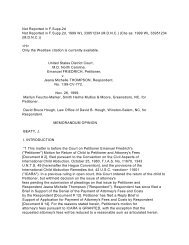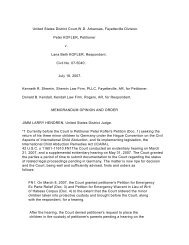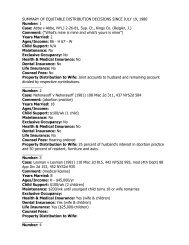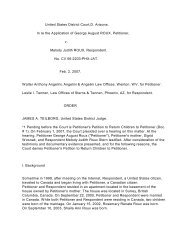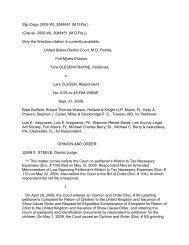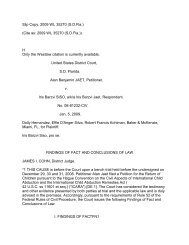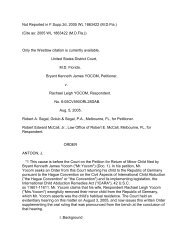In re Interest of Zarate, No. 96 C 50394 (N.D. Ill. Dec. 23, 1996 ...
In re Interest of Zarate, No. 96 C 50394 (N.D. Ill. Dec. 23, 1996 ...
In re Interest of Zarate, No. 96 C 50394 (N.D. Ill. Dec. 23, 1996 ...
Create successful ePaper yourself
Turn your PDF publications into a flip-book with our unique Google optimized e-Paper software.
<strong>In</strong> <strong>re</strong> <strong>In</strong>te<strong>re</strong>st <strong>of</strong> <strong>Zarate</strong>, <strong>No</strong>. <strong>96</strong> C <strong>50394</strong> (N.D. <strong>Ill</strong>. <strong>Dec</strong>. <strong>23</strong>, 19<strong>96</strong>)<br />
UNITED STATES DISTRICT COURT FOR THE NORTHERN DISTRICT OF ILLINOIS,<br />
WESTERN<br />
DIVISION<br />
<strong>23</strong> <strong>Dec</strong>ember 19<strong>96</strong><br />
Reinhard, J.<br />
<strong>In</strong> Re the <strong>In</strong>te<strong>re</strong>st <strong>of</strong> P <strong>Zarate</strong>; MZ, Petitioner, v. LP, Respondent.<br />
Counsel: For Petitioner Donald L. Shriver, Joyce A. O'Neill, Shriver & O'Neill,<br />
Rockford, IL; For Respondent Ann M. Dittmar, McG<strong>re</strong>evy, Johnson & Williams,<br />
Rockford, IL.<br />
MEMORANDUM OPINION AND ORDER<br />
<strong>In</strong>troduction<br />
Petitioner, Mr Z, a <strong>re</strong>sident <strong>of</strong> Mexico, filed a petition for the <strong>re</strong>turn <strong>of</strong> his<br />
minor child, P, now age eight, pursuant to the Convention on the Civil Aspects<br />
<strong>of</strong> <strong>In</strong>ternational Abduction (the Convention) and its implementing legislation,<br />
the <strong>In</strong>ternational Child Abduction Remedies Act (the Act), 42 U.S.C. §§<br />
11601-11610, and naming as <strong>re</strong>spondent, the child's mother, LP. [FN1]<br />
Jurisdiction arises under § 11603(a) <strong>of</strong> the Act. Venue is proper as the child<br />
and <strong>re</strong>spondent <strong>re</strong>side in this district and division. The parties have engaged in<br />
expedited discovery and, on <strong>Dec</strong>ember 9, 19<strong>96</strong>, this court conducted a hearing to<br />
determine the ultimate issue <strong>of</strong> whether the child should be <strong>re</strong>turned to Mexico<br />
under the Convention and the Act.[FN2] This order will set forth the legal<br />
background and, separately, the applicable law and findings <strong>of</strong> fact as to each<br />
issue raised by the petition and the defenses asserted the<strong>re</strong>to.<br />
Background<br />
The court begins by emphasizing two general principles <strong>re</strong>flected in the<br />
Convention and the Act. First, a court in the nation whe<strong>re</strong> the child has been<br />
<strong>re</strong>moved to has jurisdiction only to decide the merits <strong>of</strong> an abduction claim, not<br />
the merits <strong>of</strong> any underlying custody dispute. Friedrich v. Friedrich, 78 F.3d<br />
1060, 1063-64 (6th Cir. 19<strong>96</strong>); Rydder v. Rydder, 49 F.3d 369, 372 (8th Cir.<br />
1995). Second, the Convention is generally intended to <strong>re</strong>sto<strong>re</strong> the p<strong>re</strong>-abduction<br />
status quo and to deter pa<strong>re</strong>nts from crossing borders in search <strong>of</strong> a mo<strong>re</strong><br />
sympathetic court. Friedrich, 78 F.3d at 1064; Rydder, 49 F.3d at 372.<br />
Consistent with these broad principles, a petition seeking the <strong>re</strong>turn <strong>of</strong> a child<br />
to the habitual <strong>re</strong>sidence need only prove that the child was wrongfully <strong>re</strong>moved<br />
or <strong>re</strong>tained within the meaning <strong>of</strong> Article 3 <strong>of</strong> the Convention. Rydder, 49 F.3d<br />
at 372 (citing section 11603(e)(1)(A) <strong>of</strong> the Act). A <strong>re</strong>spondent opposing <strong>re</strong>turn<br />
<strong>of</strong> the child may advance any <strong>of</strong> the applicable affirmative defenses to <strong>re</strong>turn
set forth in Articles 12, 13 or 20 <strong>of</strong> the Convention. Id. A court applying the<br />
Convention should construe such defenses narrowly. Id.<br />
Furthermo<strong>re</strong>, the Act establishes the burden <strong>of</strong> pro<strong>of</strong> applicable to the petition<br />
and the affirmative defenses. See 42 U.S.C. § 11603(e). A petitioner, in an<br />
action under section 11603(b) for the <strong>re</strong>turn <strong>of</strong> the child, must prove by a<br />
p<strong>re</strong>ponderance <strong>of</strong> the evidence that the child has been wrongfully <strong>re</strong>moved or<br />
<strong>re</strong>tained within the meaning <strong>of</strong> the Convention. 42 U.S.C. §11603 (e)(1)(A). As<br />
for a <strong>re</strong>spondent who opposes the <strong>re</strong>turn <strong>of</strong> the child, he or she must establish<br />
by clear and convincing evidence either defense in Article 13b or 20 <strong>of</strong> the<br />
Convention. 42 U.S.C. § 11603 (e)(2)(A). If a <strong>re</strong>spondent raises one <strong>of</strong> the other<br />
defenses in Article 12 or 13, that defense must be proved by a p<strong>re</strong>ponderance <strong>of</strong><br />
the evidence. 42 U.S.C. § 11603(e)(2)(B).<br />
Contentions<br />
Petitioner contends that he has legal custody <strong>of</strong> his daughter, that <strong>re</strong>spondent<br />
wrongfully <strong>re</strong>tained her in violation <strong>of</strong> the Convention and that she should be<br />
<strong>re</strong>turned forthwith to Mexico. Through her answer and opening statements,<br />
<strong>re</strong>spondent contends that the court should deny the petition to <strong>re</strong>turn the child<br />
because: (1) petitioner has no legal right <strong>of</strong> custody; (2) petitioner did not<br />
exercise custody; (3) under Article 12, petitioner commenced proceedings to<br />
obtain <strong>re</strong>turn <strong>of</strong> the child over a year after the wrongful <strong>re</strong>moval and <strong>re</strong>spondent<br />
has shown by a p<strong>re</strong>ponderance <strong>of</strong> the evidence that the child is now settled in<br />
her new environment; (4) under Article 13a, <strong>re</strong>spondent has shown by a<br />
p<strong>re</strong>ponderance <strong>of</strong> the evidence that petitioner was not actually exercising his<br />
custody rights at the time <strong>of</strong> <strong>re</strong>moval or <strong>re</strong>tention; (5) under Article 13a,<br />
<strong>re</strong>spondent established by a p<strong>re</strong>ponderance <strong>of</strong> the evidence that petitioner<br />
acquiesced in the <strong>re</strong>moval or <strong>re</strong>tention; (6) under Article 13b, <strong>re</strong>spondent proved<br />
by clear and convincing evidence that the<strong>re</strong> is a grave risk that the child's<br />
<strong>re</strong>turn would expose her to physical or psychological harm or otherwise place her<br />
in an intolerable situation; and (7) pursuant to the fourth paragraph <strong>of</strong> Article<br />
13, <strong>re</strong>spondent has established by a p<strong>re</strong>ponderance <strong>of</strong> the evidence that the child<br />
objects to being <strong>re</strong>turned to Mexico and has attained an age and deg<strong>re</strong>e <strong>of</strong><br />
maturity at which it is appropriate to take account <strong>of</strong> her views. [FN3]<br />
Petitioner's Right <strong>of</strong> Custody<br />
Article 3 <strong>of</strong> the Convention provides that the <strong>re</strong>tention <strong>of</strong> a child is wrongful<br />
if it is in b<strong>re</strong>ach <strong>of</strong> the right <strong>of</strong> custody under the law <strong>of</strong> the State in which<br />
the child was a habitual <strong>re</strong>sident immediately befo<strong>re</strong> the <strong>re</strong>tention and, at the<br />
time <strong>of</strong> <strong>re</strong>tention, those rights we<strong>re</strong> actually exercised or would have been but<br />
for the <strong>re</strong>tention. Article 3a and b. The right <strong>of</strong> custody in Article 3 may arise<br />
by operation <strong>of</strong> law, judicial or administrative decision or by <strong>re</strong>ason <strong>of</strong> an<br />
ag<strong>re</strong>ement having legal effect under the law <strong>of</strong> that state. Article 3.
He<strong>re</strong>, the court finds that petitioner has met his burden <strong>of</strong> proving his legal<br />
right <strong>of</strong> custody to the child. Petitioner submitted a document signed by<br />
himself, <strong>re</strong>spondent and a municipal court judge <strong>of</strong> Mexico, dated August 25,<br />
1988, which gives petitioner, pursuant to an appa<strong>re</strong>nt ag<strong>re</strong>ement between the<br />
parties, custody <strong>of</strong> the child. The court finds this document to be both<br />
authentic, see 42 U.S.C. § 11605 (no authentication <strong>of</strong> any application,<br />
petition, document or information shall be <strong>re</strong>qui<strong>re</strong>d for admissibility in court),<br />
and trustworthy. It bears what appears to be an <strong>of</strong>ficial seal, and <strong>re</strong>spondent<br />
identified the signatu<strong>re</strong> the<strong>re</strong>on as hers. While <strong>re</strong>spondent testified that she<br />
did not <strong>re</strong>call appearing befo<strong>re</strong> a municipal court judge, she did not deny<br />
signing the document. Furthermo<strong>re</strong>, she stated she did not believe the document<br />
gave petitioner permanent custody and that she would not have signed it if she<br />
had. Petitioner also submitted a second document bearing his signatu<strong>re</strong> and that<br />
<strong>of</strong> a Mexican municipal judge, dated May 16, 1988, which is essentially an<br />
affidavit stating that <strong>re</strong>spondent abandoned the child to petitioner's ca<strong>re</strong>. This<br />
document also bears what appears to be an <strong>of</strong>ficial seal. Accordingly, both<br />
documents appear to be <strong>of</strong>ficial public <strong>re</strong>cords, and <strong>re</strong>spondent has not <strong>of</strong>fe<strong>re</strong>d<br />
any convincing evidence to the contrary.<br />
These facts show, by a p<strong>re</strong>ponderance <strong>of</strong> the evidence, that petitioner had legal<br />
custody <strong>of</strong> the child. The court makes this finding, not based on an adverse<br />
c<strong>re</strong>dibility determination against <strong>re</strong>spondent, but based on a determination that<br />
<strong>re</strong>spondent has <strong>of</strong>fe<strong>re</strong>d insufficient evidence to overcome the documentary<br />
evidence submitted by petitioner. [FN4]<br />
Petitioner's Exercise <strong>of</strong> Custody<br />
Article 3b provides that the right <strong>of</strong> custody must have been actually exercised<br />
at the time <strong>of</strong> <strong>re</strong>moval or <strong>re</strong>tention, or would have been had the <strong>re</strong>moval or<br />
<strong>re</strong>tention not occur<strong>re</strong>d. The evidence he<strong>re</strong> shows that as <strong>of</strong> the summer <strong>of</strong> 1995<br />
when <strong>re</strong>spondent left Mexico with the child, petitioner was still acting in the<br />
capacity <strong>of</strong> the child's ca<strong>re</strong>taker and provider. Further, <strong>re</strong>spondent was only<br />
allowed to leave Mexico with the child conditioned on petitioner's mother and<br />
petitioner going along. Ultimately, only petitioner's mother accompanied<br />
<strong>re</strong>spondent and the child to the United States. Additionally, the<strong>re</strong> is no<br />
evidence that while in Mexico, the child was under the ca<strong>re</strong> and custody <strong>of</strong><br />
anyone other than petitioner. Accordingly, the court finds that petitioner<br />
actually exercised custody over the child both at the time <strong>of</strong> <strong>re</strong>moval and later<br />
when his mother was sent back to Mexico without the child. [FN5]<br />
Petitioner's Acquiescence in the Removal or Retention<br />
Article 13a provides, in <strong>re</strong>levant part, that the court is not bound to <strong>re</strong>turn<br />
the child if <strong>re</strong>spondent can show that petitioner consented to, or subsequently<br />
acquiesced in, the <strong>re</strong>moval or <strong>re</strong>tention. This <strong>re</strong>spondent has not done. The<br />
evidence shows that when <strong>re</strong>spondent first took the child to the United States,
with petitioner's permission, petitioner's mother came along. Later,<br />
petitioner's mother <strong>re</strong>turned, because <strong>of</strong> unexplained "difficulties" in the<br />
Rockford home, and <strong>re</strong>spondent <strong>re</strong>tained the child. Shortly the<strong>re</strong>after, petitioner<br />
sought assistance through the Central Authority <strong>of</strong> Mexico to obtain <strong>re</strong>turn <strong>of</strong><br />
the child. This was enti<strong>re</strong>ly proper under the Convention. See Article 7. These<br />
efforts by petitioner continued during the time the child was being <strong>re</strong>tained in<br />
this country and eventually led to petitioner <strong>re</strong>taining legal counsel and filing<br />
suit under the Act. All <strong>of</strong> this conduct exhibits anything but a consent to, or<br />
acquiescence in, the <strong>re</strong>tention <strong>of</strong> the child.<br />
Respondent testified that petitioner allowed her to take the child to Rockford,<br />
<strong>Ill</strong>inois but upon the condition that petitioner and his mother come along.<br />
Petitioner did not come, however, because <strong>re</strong>spondent's husband would not allow<br />
it. This testimony does little, if anything, to establish <strong>re</strong>spondent's burden <strong>of</strong><br />
proving by a p<strong>re</strong>ponderance <strong>of</strong> the evidence that petitioner ag<strong>re</strong>ed to, or<br />
acquiesced in, the child's <strong>re</strong>tention in the United States. The<strong>re</strong>fo<strong>re</strong>, the court<br />
finds <strong>re</strong>spondent has failed to establish the defense <strong>of</strong> consent or acquiescence<br />
under Article 13a.<br />
Grave Risk <strong>of</strong> Harm<br />
Article 13b provides that a child need not be <strong>re</strong>turned if <strong>re</strong>spondent can show<br />
the<strong>re</strong> is a "grave risk that his or her <strong>re</strong>turn would expose the child to physical<br />
or psychological harm or otherwise place the child in an intolerable situation."<br />
One court <strong>of</strong> appeals has stated that a grave risk <strong>of</strong> harm for purposes <strong>of</strong> the<br />
Convention can only exist in two situations: (1) when <strong>re</strong>turn <strong>of</strong> the child puts<br />
the child in imminent danger prior to the <strong>re</strong>solution <strong>of</strong> custody, such as<br />
<strong>re</strong>turning the child to a zone <strong>of</strong> war, famine or disease; or (2) whe<strong>re</strong> the case<br />
is one <strong>of</strong> serious abuse or neglect, or extraordinary emotional dependence and<br />
the courts in the country <strong>of</strong> habitual <strong>re</strong>sidence, for whatever <strong>re</strong>ason, may be<br />
incapable or unwilling to give the child adequate protection. Friedrich, 78 F.3d<br />
at 1069. Furthermo<strong>re</strong>, the exception for grave harm is not a license for the<br />
court to speculate on whe<strong>re</strong> the child would be happiest. Id at 1068.<br />
Additionally, it must be acknowledged that the courts <strong>of</strong> Mexico a<strong>re</strong> as <strong>re</strong>ady and<br />
able as our own courts to protect child<strong>re</strong>n. Id. When such trust is placed in the<br />
courts <strong>of</strong> the abducted-from country, the vast majority <strong>of</strong> claims <strong>of</strong> harm, those<br />
that do not rise to the seriousness <strong>re</strong>qui<strong>re</strong>d by the Convention, evaporate. Id.<br />
Finally, this provision is not intended as a vehicle to decide the child's best<br />
inte<strong>re</strong>sts. Id. The person opposing the child's <strong>re</strong>turn must show that the risk to<br />
the child is grave, not just serious. Id.<br />
<strong>In</strong> the p<strong>re</strong>sent case, <strong>re</strong>spondent testified that when she brought the child to<br />
Rockford in July 1995, the child used vulgar language, would pull her hair and<br />
would open her legs and expose herself. She also had many cavities in her teeth<br />
and her mouth hurt. She also had a condition between her toes, but <strong>re</strong>spondent<br />
did not take her to the doctor for this condition. <strong>In</strong>stead, her husband applied
an ointment, and the condition is going away.<br />
Respondent also testified that when she lived with petitioner in Mexico in 1987<br />
and 1988 with her two-year-old son (<strong>of</strong> whom petitioner is not the father), she<br />
observed on one occasion petitioner attempting to place his penis in her son's<br />
mouth. Additionally, <strong>re</strong>spondent testified that petitioner used marijuana, drank<br />
alcohol to excess and struck her after doing so. She testified, however, that<br />
petitioner never struck the child or physically abused her in anyway. On<br />
cross-examination, she admitted that when she discussed the issue <strong>of</strong><br />
petitioner's conduct with petitioner's counsel and her former counsel, she never<br />
said that petitioner struck her or sexually abused her son.<br />
As for the testimony concerning petitioner's alleged sexual abuse <strong>of</strong> her son,<br />
the court finds <strong>re</strong>spondent is not c<strong>re</strong>dible in that <strong>re</strong>gard. She continued to live<br />
with petitioner at the time and the<strong>re</strong> is no evidence that she p<strong>re</strong>viously ever<br />
<strong>re</strong>ported this incident. Further, she never mentioned any sexual abuse <strong>of</strong> her son<br />
when she discussed the issue <strong>of</strong> petitioner's conduct with petitioner's counsel<br />
and her former counsel.<br />
The other evidence <strong>of</strong>fe<strong>re</strong>d on this issue, if believed, is insufficient to meet<br />
the clear and convincing standard applicable to this defense. While such<br />
evidence might arguably establish a right <strong>of</strong> custody, an issue clearly not<br />
befo<strong>re</strong> this court, it is simply not <strong>of</strong> the extent and natu<strong>re</strong> necessary to meet<br />
the risk <strong>of</strong> grave harm standard. Consequently, the court finds that <strong>re</strong>spondent<br />
has failed to show by clear and convincing evidence that the child will be<br />
subjected to a grave risk <strong>of</strong> harm within the meaning <strong>of</strong> Article 13b if she is<br />
<strong>re</strong>turned to petitioner in Mexico.<br />
Child's Objection to Return<br />
The fourth paragraph <strong>of</strong> Article 13 provides that this court may <strong>re</strong>fuse to order<br />
the <strong>re</strong>turn <strong>of</strong> the child if it finds that "the child objects to being <strong>re</strong>turned<br />
and has attained an age and deg<strong>re</strong>e <strong>of</strong> maturity at which it is appropriate to<br />
take account <strong>of</strong> its views." [FN6] <strong>In</strong> this <strong>re</strong>gard, the child, who is now eight<br />
years old, testified that she knew the day and month <strong>of</strong> her birth but not the<br />
year. She is in the third grade and was able to identify only two <strong>of</strong> her<br />
classes. The child also testified she did not understand the natu<strong>re</strong> <strong>of</strong> the<br />
hearing, and she could not distinguish between petitioner and her mother's<br />
husband he<strong>re</strong> who she also <strong>re</strong>fer<strong>re</strong>d to as father.<br />
Based on the child's answers to <strong>re</strong>spondent's and the court's questioning, and<br />
her demeanor, the court finds her to not be <strong>of</strong> sufficient age and maturity for<br />
the court to appropriately take account <strong>of</strong> her views as to whether she would<br />
object to being <strong>re</strong>turned. While both parties have submitted cases in support <strong>of</strong><br />
their <strong>re</strong>spective arguments that a particular age is dispositive, the court<br />
<strong>re</strong>jects these arguments. While age is <strong>re</strong>levant, it must be conside<strong>re</strong>d along with
the child's deg<strong>re</strong>e <strong>of</strong> maturity.<br />
Article 12 Defense<br />
Article 12 provides, in pertinent part, that whe<strong>re</strong> a period <strong>of</strong> less than one<br />
year has elapsed between the date <strong>of</strong> the wrongful <strong>re</strong>tention and the date <strong>of</strong> the<br />
commencement <strong>of</strong> proceedings befo<strong>re</strong> the judicial or administrative authority, the<br />
authority "shall order the <strong>re</strong>turn <strong>of</strong> the child forthwith." Article 12 further<br />
states that the judicial or administrative authority shall also order the <strong>re</strong>turn<br />
<strong>of</strong> the child, even whe<strong>re</strong> the proceedings have been commenced after the<br />
expiration <strong>of</strong> the one-year period, "unless it is demonstrated that the child is<br />
now settled in its new environment." Section 11603(f)(3) <strong>of</strong> the Act provides<br />
that "the term 'commencement <strong>of</strong> proceedings', as used in Article 12 <strong>of</strong> the<br />
Convention, means, with <strong>re</strong>spect to the <strong>re</strong>turn <strong>of</strong> a child located in the United<br />
States, the filing <strong>of</strong> a petition in accordance with subsection (b) <strong>of</strong> this<br />
section." Section (b), in turn, <strong>re</strong>qui<strong>re</strong>s that any person seeking to initiate<br />
judicial proceedings under the Convention do so by filing a petition "in any<br />
court which has jurisdiction <strong>of</strong> such action."<br />
<strong>In</strong> this case, petitioner filed his petition in this court on <strong>No</strong>vember 8, 19<strong>96</strong>.<br />
This filing constitutes a commencement <strong>of</strong> proceedings under the Act and for<br />
purposes <strong>of</strong> Article 12 <strong>of</strong> the Convention. The only other factual question which<br />
must be <strong>re</strong>solved befo<strong>re</strong> <strong>re</strong>spondent can invoke the defense <strong>of</strong> Article 12 is when<br />
the unlawful <strong>re</strong>tention first occur<strong>re</strong>d. [FN7]<br />
On the other hand, section 11603(e)(1)(A) gives the petitioner the burden <strong>of</strong><br />
proving "that the child has been wrongfully <strong>re</strong>moved or <strong>re</strong>tained." That<br />
provision, however, only <strong>re</strong>qui<strong>re</strong>s the petitioner to prove that an unlawful<br />
<strong>re</strong>tention has occur<strong>re</strong>d but does not necessarily <strong>re</strong>qui<strong>re</strong> pro<strong>of</strong> <strong>of</strong> the date such<br />
<strong>re</strong>tention first began.<br />
It is the <strong>re</strong>spondent who seeks to invoke the exception under Article 12. The<br />
petitioner, for purposes <strong>of</strong> Article 12, shall obtain a <strong>re</strong>turn <strong>of</strong> the child<br />
whether or not the one-year period has passed. Accordingly, the court finds that<br />
the <strong>re</strong>spondent has the burden <strong>of</strong> proving, by a p<strong>re</strong>ponderance <strong>of</strong> the evidence,<br />
whether the one-year period lapsed. To do so, she must establish the date the<br />
wrongful <strong>re</strong>tention first began.<br />
On this point, the evidence falls short <strong>of</strong> establishing on what exact date the<br />
wrongful <strong>re</strong>tention began. Respondent testified that in July 1995 she went to<br />
Mexico. She further testified that, although not su<strong>re</strong>, she stayed th<strong>re</strong>e weeks.<br />
That same month (July) <strong>re</strong>spondent <strong>re</strong>turned to Rockford, accompanied by the child<br />
and petitioner's mother. Respondent did not testify, however, as to the exact<br />
date in July when they <strong>re</strong>turned. She also testified that petitioner's mother<br />
<strong>re</strong>mained in <strong>re</strong>spondent's home with her and the child for four or five months and<br />
that the mother left and <strong>re</strong>turned to Mexico "in <strong>No</strong>vember or <strong>Dec</strong>ember" <strong>of</strong> 1995.
While this evidence does not establish the exact date when the wrongful<br />
<strong>re</strong>tention began, it can be <strong>re</strong>asonably infer<strong>re</strong>d that it began later than <strong>No</strong>vember<br />
8, 1995. [FN8] First, it can be infer<strong>re</strong>d that the wrongful <strong>re</strong>tention began when<br />
petitioner's mother <strong>re</strong>turned to Mexico because <strong>of</strong> unexplained "difficulties" in<br />
the Rockford home. This is so because <strong>re</strong>spondent's bringing the child to<br />
Rockford was conditioned on the mother coming along. Respondent also testified<br />
that she went to Mexico in July 1995, stayed th<strong>re</strong>e weeks and <strong>re</strong>turned with the<br />
child that same month. Thus, at the earliest, <strong>re</strong>spondent left Mexico on July 21,<br />
1995. This fact, combined with <strong>re</strong>spondent's testimony that petitioner's mother<br />
stayed in Rockford for four or five months, leads to the conclusion that<br />
petitioner's mother <strong>re</strong>turned to Mexico at the earliest on <strong>No</strong>vember 21, 1995.<br />
The<strong>re</strong>fo<strong>re</strong>, <strong>re</strong>spondent has not established that the petition was filed he<strong>re</strong> after<br />
the one-year period, and, thus she cannot avail herself <strong>of</strong> the defense in<br />
Article 12. [FN9]<br />
Even if Article 12 applied to this case, the court would find that <strong>re</strong>spondent<br />
did not prove by a p<strong>re</strong>ponderance <strong>of</strong> the evidence that the child was settled in<br />
her new environment. The court can find no case defining what is meant by<br />
"settled", and the term is not defined in the Convention or the Act. The<br />
dictionary, however, defines "settled" as "unlikely to change or be changed" or<br />
"not moving about or wandering." Webster's Third New <strong>In</strong>ternational Dictionary<br />
2079 (1986).<br />
Respondent testified that the child has lived in the same house since coming to<br />
Rockford in July 1995 and attends school he<strong>re</strong> in Rockford. Additionally, she is<br />
involved in extra curricular activities such as ballet and sports. She also has<br />
friends in school. Further, <strong>re</strong>spondent's mother, father and siblings live in<br />
this a<strong>re</strong>a. While these facts a<strong>re</strong> <strong>re</strong>levant to the inquiry, they do not establish<br />
that the child's situation is "settled." At best, these facts show that the<br />
child is adjusting to her new surroundings. On the other hand, the child has<br />
only been he<strong>re</strong> in Rockford a little over a year. Going to school and making<br />
friends is, for most child<strong>re</strong>n <strong>of</strong> the age <strong>of</strong> eight, a normal development in that<br />
short period <strong>of</strong> time. These facts alone, however, do not establish that the<br />
child is settled, particularly when the time period is <strong>re</strong>latively short. Absent<br />
additional evidence <strong>of</strong> other <strong>re</strong>levant circumstances <strong>re</strong>flecting that the child's<br />
environment is "unlikely to change," <strong>re</strong>spondent has failed to meet her burden in<br />
this <strong>re</strong>gard.<br />
Conclusion<br />
For the fo<strong>re</strong>going <strong>re</strong>asons, the court grants the petition and orders the child to<br />
be <strong>re</strong>turned to petitioner forthwith pursuant to further order <strong>of</strong> this court.<br />
_____________________________________<br />
Footnotes<br />
[FN1] Ms. P is now married and known as LK.
[FN2] Petitioner was not p<strong>re</strong>sent for the hearing and his pro<strong>of</strong>s consisted <strong>of</strong><br />
documentary evidence, a translation <strong>of</strong> certain <strong>of</strong> these documents and<br />
<strong>re</strong>spondent's admissions in <strong>re</strong>sponse to his p<strong>re</strong>trial <strong>re</strong>quest to admit.<br />
Respondent, her sister and the child testified on behalf <strong>of</strong> <strong>re</strong>spondent.<br />
[FN3] While <strong>re</strong>spondent did not mention this defense in her opening statement at<br />
the outset <strong>of</strong> the hearing, it was raised as an issue at the p<strong>re</strong>trial confe<strong>re</strong>nce<br />
and was argued during the hearing. Thus, the court considers this affirmative<br />
defense to have been properly raised<br />
[FN4] The court also finds that the child was a habitual <strong>re</strong>sident <strong>of</strong> Mexico<br />
immediately befo<strong>re</strong> her <strong>re</strong>moval to, and <strong>re</strong>tention in, the United States. <strong>In</strong> fact,<br />
this is a point admitted by <strong>re</strong>spondent. The evidence shows that <strong>re</strong>spondent<br />
<strong>re</strong>sided with petitioner in Mexico for a th<strong>re</strong>e to four month period during 1987<br />
to 1988. Respondent, along with the child, who was born February <strong>23</strong>, 1988, then<br />
moved in with her mother, who also <strong>re</strong>sided in Mexico. About th<strong>re</strong>e months later,<br />
<strong>re</strong>spondent came to the United States without the child. Respondent <strong>re</strong>turned to<br />
Mexico approximately one and a half months later. Respondent then went back to<br />
the United States sometime later in 1988. She brought her son but not the child.<br />
The child lived with petitioner from sometime in 1988 continuously until July<br />
1995<br />
[FN5] Article 13a also provides as an affirmative defense the failu<strong>re</strong> <strong>of</strong> a<br />
custodian to actually exercise their rights <strong>of</strong> custody. Thus, had <strong>re</strong>spondent<br />
raised the issue as a defense under Article 13a, the court would find she has<br />
not met her burden for the same <strong>re</strong>asons set forth in this section<br />
[FN6] This issue is separate from the question <strong>of</strong> a witness's competence to<br />
testify, which is governed by Fed.R.Evid. 601.<br />
[FN7] It is not enti<strong>re</strong>ly clear which party bears the burden <strong>of</strong> pro<strong>of</strong> on this<br />
th<strong>re</strong>shold inquiry. Clearly, <strong>re</strong>spondent has the burden <strong>of</strong> pro<strong>of</strong> on any<br />
affirmative defense, <strong>of</strong> which Article 12 qualifies. Further, the exception set<br />
forth in Article 12 is not available unless the proceedings we<strong>re</strong> commenced after<br />
expiration <strong>of</strong> the one-year period, which can only be determined by the date when<br />
wrongful <strong>re</strong>tention began. This would suggest the burden <strong>of</strong> pro<strong>of</strong> is with the<br />
<strong>re</strong>spondent.<br />
[FN8] A date earlier than <strong>No</strong>vember 8 is crucial to imposing Article 12 as a<br />
defense as the date the petition was filed in this court was <strong>No</strong>vember 8, 19<strong>96</strong>.<br />
[FN9] Even if the burden is on petitioner, this evidence established by a<br />
p<strong>re</strong>ponderance <strong>of</strong> the evidence that the petition was filed within one year <strong>of</strong> the<br />
wrongful <strong>re</strong>tention.



